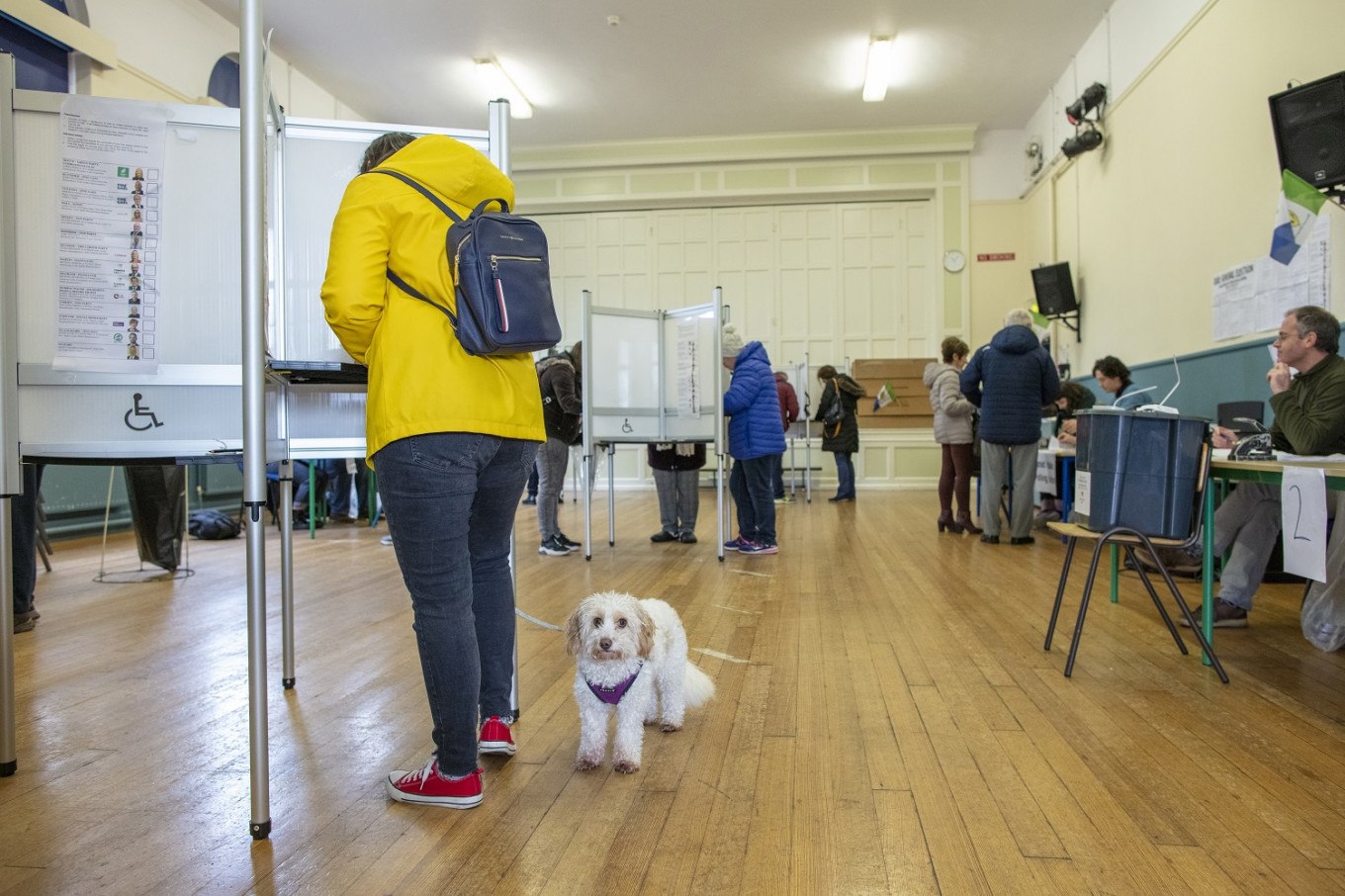Popular Reads
Top Results
Can't find what you're looking for?
View all search resultsPopular Reads
Top Results
Can't find what you're looking for?
View all search resultsCounting to start in Ireland's 'three-way tie' election
Change text size
Gift Premium Articles
to Anyone
 A woman fills out her ballot paper in a booth as her dog waits patiently, at Bunscoil Chriost Ri school in Cork, in southern Ireland on Feb, 8, as voting gets underway in the Irish General election. - Polls opened across the country at 0700 GMT, although a small number of islands off the west coast voted on Friday to allow for rough seas that could disrupt the transport of ballots by boat. (AFP/Paul Faith)
A woman fills out her ballot paper in a booth as her dog waits patiently, at Bunscoil Chriost Ri school in Cork, in southern Ireland on Feb, 8, as voting gets underway in the Irish General election. - Polls opened across the country at 0700 GMT, although a small number of islands off the west coast voted on Friday to allow for rough seas that could disrupt the transport of ballots by boat. (AFP/Paul Faith)
V
ote-counting begins on Sunday following Ireland's general election which exit polls called as a three-way tie, meaning every ballot will count in the battle to form the next government.
Prime Minister Leo Varadkar's incumbent Fine Gael party, center-right rivals Fianna Fail and left-wingers Sinn Fein, on a dramatic surge in support, all received 22 percent of first preference votes, according to an Ipsos MRBI exit poll issued as the polls closed on Saturday.
The survey of around 5,000 voters -- which has an estimated margin of error of 1.3 percent -- put Fine Gael on 22.4 percent, Sinn Fein on 22.3 percent and Fianna Fail on 22.2 percent.
The Greens were next on 7.9 percent and Labor on 4.6 percent.
However, Ireland uses a single transferable vote system to elect multiple deputies from each of the 39 constituencies, making it hard to extrapolate a likely seat forecast from the first preference votes exit poll.
Count centers will begin sorting ballot papers from the estimated 3.3 million eligible voters at 0900 GMT.
Some 159 seats are up for grabs in the Dail, the Republic of Ireland's lower house of parliament, but filling them may not be quick due to the multiple rounds of counting required.
Eunan O'Halpin of Trinity College Dublin university said it would take "perhaps two-and-a-half days for the full picture to be known" in terms of seats.
Coalition posturing
The shape of the government could take much longer to come into focus and may hinge on inter-party negotiations once the seat spread becomes clear.
Following Ireland's 2016 election it took 70 days before a new minority coalition government was formed under Fine Gael.
During this year's election campaign, Fine Gael and Fianna Fail both ruled out working with Sinn Fein, citing the party's historic links to the Irish Republican Party paramilitary group.
During "The Troubles" --- 30 years of bloodshed when 3,500 were killed by bombs and bullets -- the party acted as the political wing of the IRA in its battle to unite the British territory of Northern Ireland with the Republic of Ireland.
Fianna Fail leader Micheal Martin also said he would not back centre-right rivals Fine Gael in a "grand coalition".
But his party has propped up the Fine Gael minority government through a confidence and supply arrangement since the last election -- suggesting common ground could be found again.
And analysts have said statements ruling out coalitions could be pre-election posturing, and party stances may change as the parliamentary arithmetic becomes clear.
"We've never seen a general election result like it. Basically a statistical tie between what are now the three big parties," said Pat Leahy, political editor of The Irish Times newspaper.
He told RTE television that forming a government could prove "a very difficult exercise" unless parties compromised on their pre-election stances.
PM's future in the balance
Varadkar became Ireland's prime minister in June 2017 after an internal Fine Gael leadership contest. The party had been in power since 2011 under his predecessor Enda Kenny.
Saturday was Varadkar's first time facing voters at the polls as the PM, or taoiseach.
Just 41 years old, he is Ireland's first mixed-race and openly gay premier who has come to represent a more socially progressive nation after years of dominance by the Roman Catholic Church.
He plumped for an early election after successfully helping to broker a deal cushioning Britain's EU exit on January 31 by avoiding a hard border with Northern Ireland.
Varadkar's campaign was focused on Brexit -- but did not seem to land with voters concerned with issues of healthcare, housing and homelessness.
"The government handled the Brexit as good as could be done, but that's over. There's a phrase 'eaten bread is quickly forgotten'," O'Halpin told AFP.
Irish voters tend to vote on local issues, he added.









